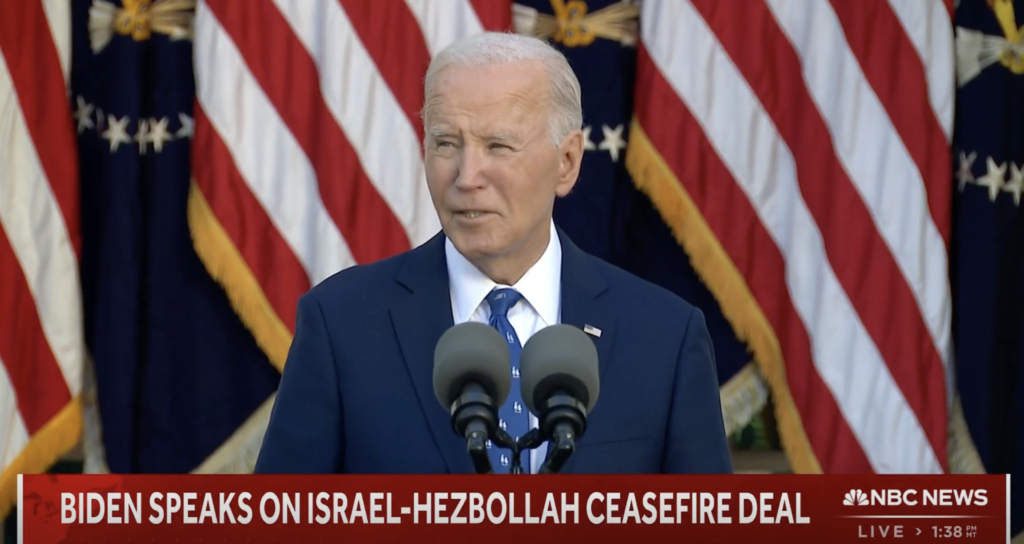US Peace Facade in Middle East Contrasts with Militant Foreign Policy

By: Ghassan Rubeiz / Arab America Contributing Writer
Editors Note: A ceasefire was announced yesterday. A truce between Israel and Hezbollah is a positive step forward, but it is neither a peace agreement nor a settlement between the two states. Border issues between Lebanon and Israel remain vague. The Lebanese people remain divided on how to help Hezbollah re-integrate into society. In the absence of a Lebanese President, it will be hard to preserve Lebanese unity; the next few weeks are critical for Lebanon and its relations with Israel. Like previous Arab-Israeli agreements, this ceasefire might fail as it seems to be half-baked. Let us hope for the best.
In a statement released last week, Representative Rashida Tlaib reacted to the International Criminal Court’s release of arrest warrants for Benjamin Netanyahu and Yoav Gallant, saying the decision “signals that the days of the Israeli apartheid government operating with impunity are ending.” The American-Arab Anti-Discrimination Committee also recently hailed the 19 Democratic Senators who recently voted unsuccessfully to stop sending US weapons to Israel over its misconduct in Gaza.
I certainly share such sentiments of appreciation for international solidarity for Palestine, but I remain cautious about the depth of this concern. For decades, we have watched isolated and largely symbolic gestures of solidarity with the Palestinians. Still, the international community seems helpless in enforcement of the rule of law during wars and their aftermath. Arab Americans should consider new ways to make their representatives pay more attention. Two ideas come to mind: first, systematically challenge the extensive American military presence in the Arab world; second, expose the contradictions that are baked into the four so-called “Abraham Accords.”
The extensive US military presence in the Arab world is hard to justify. The thousands of American troops stationed in Qatar, Bahrain, Saudi Arabia, and other Arab states are not needed: neither the host countries nor the United States benefit from the arrangement. The troops are also not welcome: Arabs do not appreciate having their fate placed in the hands of people of a different culture and political orientation. Arab-Americans should hold the United States to account for stationing its largest military assets in the Arab world while at the same time maintaining a symbiotic relationship with Israel, an Arab neighbor state, which regrettably, has since its birth often acted against the interests of the Arabs, in particular the Palestinians.
It is also time to rethink the premises of the established Israel-Egypt and Israel-Jordan peace agreements. If the initial historic accord between Egypt and Israel did not lead to any progress for Palestinian self-determination, why did Jordan establish peace with Israel? Likewise, if neither accord led to any measurable gains for the Palestinian cause, what is the rationale for establishing ever-closer regional ties with Israel? After the devastation of Iraq and Gaza, in which American complicity has been well established, how can Washington pursue additional Arab-Israeli partnerships that are hollow in substance, divisive in format, and questionable to the people of the region?
History has shown — and Arab Americans can confidently argue — that the best support America has offered to the Arab world has taken the form of educational and medical assistance, not political or military intervention. Arab Americans have a responsibility to make sure the US sees more in the Arab world than simply a place to park military assets and extract oil. As US foreign policy enters a volatile new phase, honest conversations can and should shape that policy in ways that can benefit both the United States and the Middle East, including Israel and Iran, in the long term.
Ghassan Rubeiz is the former Middle East Secretary of the World Council of Churches. Earlier, he taught psychology and social work in his country of birth, Lebanon, and later in the United States, where he currently lives. For the past twenty years, he has contributed to political commentary and delivered occasional public talks on subjects related to peace, justice, and interfaith. You can reach him at rubeizg@gmail.com
The views and opinions expressed in this article are those of the author and do not necessarily reflect the position of Arab America. The reproduction of this article is permissible with proper credit to Arab America and the author.
Check out our Blog here!








